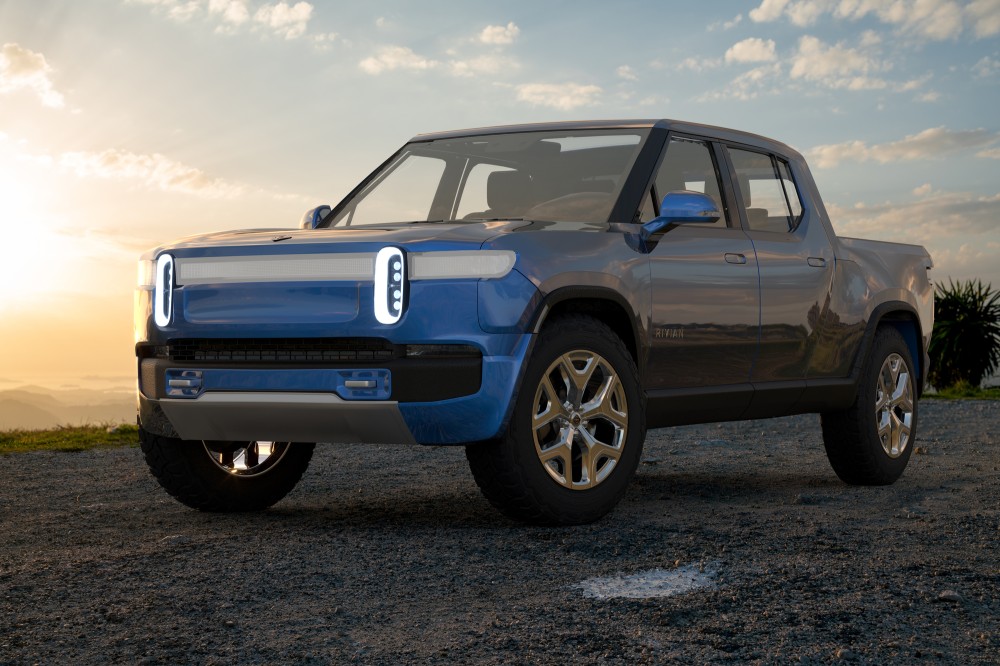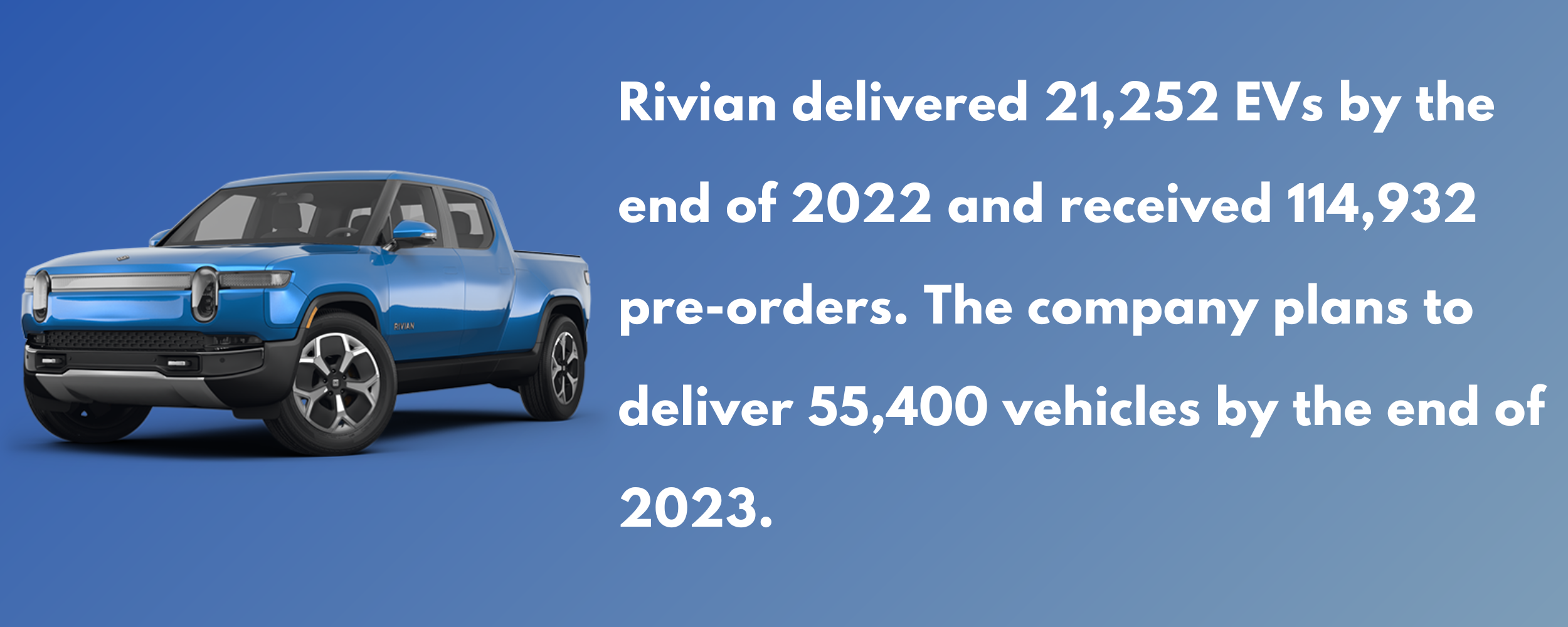
When it comes to electric vehicle (EV) manufacturers, Rivian is one of the newest kids on the block. Founded in 2009, this US-based company focuses most of its efforts on trucks and SUVs, unlike Tesla, the well-established EV brand of Elon Musk [1]. One of the most popular EV brands in the world, Tesla is generally focused on aesthetics, speed, and overall luxury. Rivian, on the other hand, has taken a different approach altogether, producing vehicles which are designed for adventure (think: off-roading and all-adventure capabilities). And this approach appears to be working well for Rivian. But how does this up-and-coming brand stack up against existing EV giants like Tesla, and how many Rivian vehicles have been sold thus far?
Continue reading to learn more about this newcomer.
TL;DR: As of December 31, 2024, Rivian has sold a total of 133,521 vehicles. In 2024, the company aimed to produce 57,000 vehicles and successfully delivered 51,580 of them.
Key statistics
- As of 31st Dec 2024, Rivian had delivered 1,33,521 vehicles.
- Rivian produced 24,337 vehicles in 2022, 2,297% more than 2021 (1,015) [2]
- Rivian delivered 20,332 vehicles in 2022, 2,110% more than 2021 (920) [2]
- The EPA range for the R1T pickup truck is 314 miles, while the R1S SUV has a range of 316 miles [3]
- The R1T is Rivian’s more popular model [4]
- Rivian has a production goal of 50,000 vehicles by the end of 2023 [5]

History
What began in 2009 as Mainstream Motors became Rivian after a name change in 2011. Since then, the company has received massive interest from backers and partners, including Amazon and Ford.
After remaining tight-lipped about its progress, the company first revealed its fully electric R1T pickup and R1S SUV prototypes at the 2018 LA Auto Show [3]. Production was slated to begin in 2020, but the supply issues and chip shortages that came with the pandemic caused significant delays [1].
Still, by September 2021, the company delivered its first customer vehicle, a blue Rivian R1T electric pickup truck—the first fully electric pickup on the market [3]. A few weeks later, Rivian became a publicly traded company in one of the largest initial public offerings (IPO) in US history [6].
With headquarters in Irvine, CA and its manufacturing hub in Normal, IL, Rivian plans to open a second production plant in Georgia in the coming years. In the meantime, the company has
been busy balancing production of consumer R1T and R1S vehicles as well as a commercial order for Amazon, who ordered 100,000 electric delivery vans [3].
Range
Around the same time as its first delivery in September 2021, Rivian announced the official Environmental Protection Agency’s (EPA) range of their first-edition R1T pickup truck and R1S SUV as 314 miles and 316 miles, respectively [3]. This was on par with the company’s estimate of about 300 miles [3].
Total Rivians delivered to date
Now, how many Rivians have been sold? Since its first delivery in 2021, Rivian has continued to ramp up production and deliveries. To date, Rivian has delivered 21,252 vehicles.
See the below breakdown by year:
2022 [7]
- Production: 24,337
- Deliveries: 20,332
2021 [2]
- Production: 1,015
- Deliveries: 920
At 24,337 units produced in 2022, Rivian was just shy of its annual production guidance of 25,000 [2]; however, despite not meeting this goal, Rivian posted revenue of $1.66 billion that same year [8]. And, considering all the supply chain issues it faced, Rivian is still making impressive progress, especially compared to both the 1,015 vehicles it produced [9] and 920 vehicles delivered in 2021 [10].
Year | Rivian Vehicles Delivered |
2021 | 920 |
2022 | 20,332 |
Annual sales trends by quarter
2022 marked Rivian’s first full calendar year of production [12], so while 2021 saw much lower numbers, it’s interesting to see how deliveries increased over each quarter since its first delivery.
2021 deliveries
- Q1: n/a
- Q2: n/a
- Q3: 11
- Q4: 909 [10]
2022 deliveries
- Q1: 1,227 [13]
- Q2: 4,467 [14]
- Q3: 6,584 [15]
- Q4: 8,054 [16]
How do Rivian sales stack up against rivals like Tesla?
As a newcomer, Rivian is an impressive startup which rivals long-standing giants such as Toyota, GM, and Ford. In fact, The Rivian R1T was the first fully electric pickup on the market, before even the highly anticipated Ford F-150 Lightning [3].
It can also play ball with all-electric manufacturers Tesla and Lucid Motors. Below, we’ve included overall manufacturer stats for comparison.
2022 EV units sales by manufacturer in the US [4]:
- Audi: 16,177
- BMW: 15,589
- Brightdrop: 155
- Cadillac: 122
- Chevrolet: 38,120
- Ford: 61,575
- Genesis: 1,590
- GMC: 854
- Hyundai: 26,693
- Jaguar: 298
- Kia: 27,965
- Lucid: 2,656
- Mazda: 324
- Mercedes-Benz: 12,421
- Mini: 3,665
- Nissan: 12,226
- Polestar: 9,322
- Porsche: 7,271
- Rivian: 20,332
- Subaru: 919
- Tesla: 522,388
- Toyota: 1,220
- Volvo: 7,346
- Volkswagen: 20,511
When looking at the above EV sales for 2022, only six manufacturers outsold Rivian, which are listed below:
- Tesla: 522,388
- Ford: 61,575
- Chevrolet: 38,120
- Kia: 27,965
- Hyundai: 26,693
- Volkswagen: 20,511
- Rivian: 20,332
Interestingly, Volkswagen sold just 179 more EVs than Rivian in 2022. That’s quite impressive when comparing the long-standing credibility of Volkswagen versus the startup of Rivian.
The R1T is Rivian’s more popular model
To date, the R1T pickup outsold the R1S SUV. Below, see the estimated breakdown of each Rivian model sold:
2022 Sales [4]:
- Rivian EDV 700 (commercial vans): 2,230
- Rivian R1S: 676
- Rivian R1T: 17,426
2021 Sales [4]:
- Rivian EDV 700: n/a Rivian R1S: 8
- Rivian R1T: 575
What about back orders?
By the end of Q3 2022, Rivian had reported about 114,000 preorders for the R1T and R1S. The company expects this backlog of orders to persist into 2024 [8] but emphasized that it would not report pre-order data going forward [11].
2023 delivery guidance
As for 2023, Rivian is aiming to produce 55,400 vehicles by the end of the year. This is more than double the amount it produced in 2022 [5] and 13,000 units less than analyst estimates for 2023 [11].
The company is still facing production roadblocks as supply chain and parts issues are set to carry into 2023. Still, the company expects these issues to be more predictable than 2022 [11].
A look ahead
Heading into the rest of 2023, Rivian plans to continue to ramp up production in order to meet its 50,000-units goal while working to drive down costs [8].
It also announced that the Rivian Max Pack batteries are projected to be available for the R1T pickup and R1S SUV by Fall 2023. The Max Pack battery increases the range of the R1T to 400 miles and the R1S to 390 miles, both up 50 miles from the current Large Pack [11].
Construction of its new $5 billion production facility will also continue throughout the year; the plant is set to open in Georgia by 2024 [17]. Finally, Rivian will work away on its next-generation R2 line—a smaller and more affordable platform than the R1 range—in time for an expected launch of 2026 [17].
Closing thoughts
In sum, Rivian is proving to be quite the contender in the electric vehicle domain. The manufacturer continues to see impressive growth and has established itself as an adventure EV brand to rival both fully EV brands such as Tesla and long-standing brands such as Ford and GM. With the opening of its Georgia production facility in the coming years, we hope to see nothing but continued growth.
